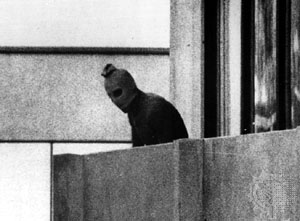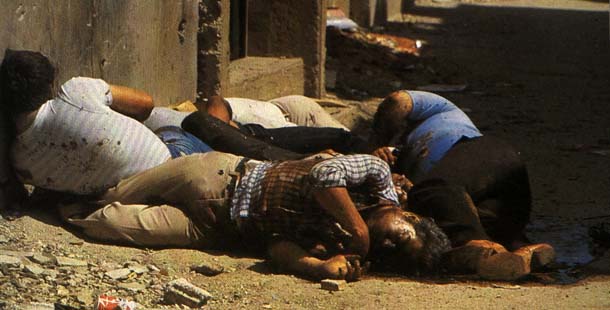Political Violence
On April 19, 1995, Timothy McVeigh set off a car bomb which destroyed the Alfred P. Murrah Federal Building in Oklahoma City in the worst act of terrorism in U.S. history, leaving 167 dead and at least 460 injured. McVeigh's lawyers sought to defend his actions as stemming from righteous anger over the U.S. federal government's role in the Waco fiasco in 1993. Such apologizing and rationalization from the political right should be ridiculed by all decent people as severely as the left was for defending the "New Left" urban terrorism in the 1970s.
"So many bastions of civilisation have been surrendered to the enemy without a fight that we have almost forgotten how to arm ourselves against barbarism. We can, in fact, do it in only one way: by stating that terrorism is always and in every circumstance wrong; that it is not only intrinsically wrong but the antithesis of political idealism; that it must be resisted by every means at our disposal; and that those who practise it must not only be punished by repudiated by those who share their political aims."Paul Johnson
"The Recovery of Freedom"
"The virtue we should cherish most is the courage to resist violence, especially if this involves flying in the face of a public opinion which, in its fear, and in its anxiety for peace, is willing to appease the violators. Above all, violence should never be allowed to pay, or be seen to pay."
Paul Johnson
"Enemies of Society"
Palestine Liberation Organization terrorist on balcony of dormitory of Israeli atheletes during the 1972 Olympic games in Munich. They would later murder 11 Israeli atheletes.
"...the political terrorism of the Seventies was a product of moral relativism. In particular, the unspeakable cruelties it practised were made possible only by the Marxist habit of thinking in terms of classes rather than individuals. Young radical ideologues who kept their victims... blindfolded, their ears sealed with wax, for weeks or months, then dispatched them without pity or hesitation, did not see those they tortured and murdered as human beings but as pieces of political furniture. In the process they dehumanized themselves as well as those they destroyed and became lost souls, like the debased creatures Dostyevsky described in his great anti-terrorist novel, "The Devils." Terrorist Groups Threatened Western Democracy in the 1970s
Some terrorist groups...
- Japanese Red Army
- Irish Republican Army
- Palestine Liberation Organization
- American Weather Underground
- German Baader-Meinhoff Gang
- French Accion Directe
- Italian Red Brigades
- Arab Black September
- Uruguayan Tupamaros
- U.S. New World Liberation Front
Paul Johnson
"Modern Times"
"Man is a wolf to man."
Roman proverb
"They [the terrorists] reject democracy really. The notion that violence is a technique of last resort, to be adopted only when all other attempts to attain justice have failed, is rejected by them. In doing so, they reject the mainstream of Western thinking, based, like most of our political grammar, on the social-contract theorists of the seventeenth century. Hobbes and Locke rightly treated violence as the antithesis of politics, a form of action characteristic of the archaic realm of the state of nature. They saw politics as an attempt to create a tool to avoid barbarism and make civilisation possible: politics renders violence not only unnecessary but unnatural to civilised man. Politics is an essential part of the basic machinery of civilisation, and in rejecting politics terrorism seeks to make civilisation unworkable."
VIOLENCE AND BARBARISM
Paul Johnson
"The Recovery of Freedom"
Some discussions....
"My guess is you are American."
"You are vastly ill-informed about direct political action."
![]()


